Nurses union calls for independent inquiry into long-term care sector
The New Brunswick Nurses Union is calling on the Higgs government to order an independent inquiry into the long-term care sector, citing the "growing severity" of several issues, including low staffing ratios, residents sometimes going without care, such as toilet use and bathing, and an increase in violence.
In a report released on Thursday, the union describes the system as being "in desperate need of reform."
Nearly half of the province's nursing homes failed to meet their minimum safe staffing ratios in 2019, according to the report, entitled The Forgotten Generation: An Urgent Call for Reform in New Brunswick's Long-Term Care Sector.
In some cases, one registered nurse (RN) took care of as many as 200 residents. In other cases, not even one RN was on duty for more than a month.
"Overwhelming evidence supports that safe staffing ratios lead to reductions in resident mortality, fewer medication errors and improved resident outcomes," the report states.
Many crucial care tasks are being left undone, according to a survey of the 505 unionized RNs who work in the province's 68 non-profit and private nursing homes.
Sixty-three per cent of roughly 130 respondents said the job of toileting residents, for example, is being left undone sometimes (32 per cent), often (22 per cent) or always (nine per cent), while 58 per cent reported that bathing residents is being left undone sometimes (31 per cent), often (18 per cent) or always (eight per cent).
"Unacceptable delays in care tasks like toileting or bathing could be seen as neglect serious enough to constitute abuse," the report written by Jeff Hull, the union's education research officer, states.
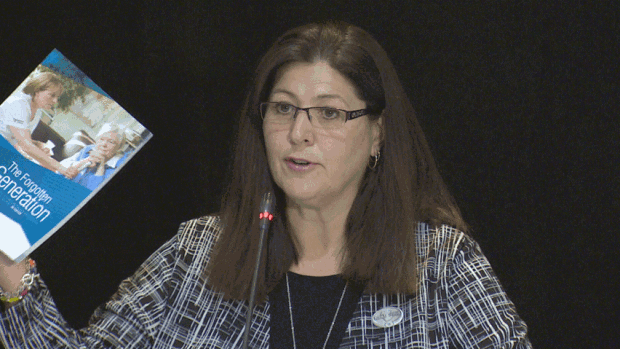
Meanwhile, accepted workplace violence claims by nursing home employees more than doubled between 2013 and 2018 to nearly 80. That's more than double those from employees of prisons, according to the union.
"Sadly, what our report makes clear is that — when it comes to long-term care — Government has floundered to find solutions," president Paula Doucet said in a statement.
The nearly 200-page report, which took almost two years to complete, involving access-to-information requests, interviews and surveys, also "raises serious questions about transparency, accountability and Government's duty of care," said Doucet.
It should serve as a "wake-up call," she said. "Our most vulnerable seniors are at risk."
The report makes a total of 38 recommendations to both the provincial and federal governments, covering everything from long-term care governance to nursing shortages and finances, to transparency and accountability, and violence in the workplace.
Premier Blaine Higgs, who has rejected repeated calls for a public inquiry into the justice system, did not respond to a request for comment.
Transfer oversight, end privatization
The union argues the province should transfer oversight responsibility for nursing homes from the Department of Social Development back to the Department of Health, where it was prior to 2000.
"Resident acuity, governance capacity, effective oversight, medical expertise, efficiency and national standards are just some of the many reasons such a change should be made immediately," the report states.
New Brunswick is the only province in Canada where the care of seniors in nursing homes remains overseen by anything other than a health department, it adds.
The introduction of for-profit nursing homes in New Brunswick has not solved the problems it was meant to address. - Report by the New Brunswick Nurses Union
The report also calls for the government to "immediately and permanently halt efforts to privatize" the nursing home sector.
"The introduction of for-profit nursing homes in New Brunswick has not solved the problems it was meant to address," the report alleges.
And a survey of 500 New Brunswickers found 55 per cent of respondents are either moderately or extremely concerned about "the introduction of a profit motive" into long-term care, it states.
In addition, the union claims for-profit long-term care homes provide "significantly less care to residents and produce substantially worse outcomes."
Consider COVID, says minister
Social Development Minister Bruce Fitch, who only took over as minister a couple of weeks ago, said "a number" of reports on senior care have been done over the years — 16 since 2004, according to the union.
"I think it's time for some action on some of these things and I've asked the department to do a significant drill down on these recommendations," Fitch told CBC News.
He said he needs more time to review the report to better understand where the data came from, and how it was interpreted, before he can comment on any specifics, suggesting "some of these items could be already looked after."
But Fitch did say he thinks keeping long-term care under Social Development is best, at least for now, during the COVID-19 pandemic.
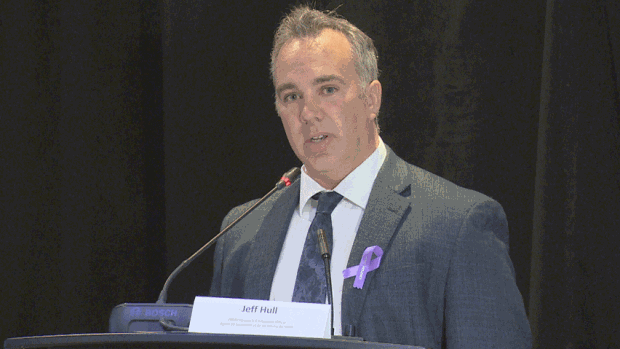
Two special care homes — the Manoir Notre-Dame in Moncton, and Manoir de la Sagesse in Campbellton — are currently dealing with COVID-19 outbreaks. Earlier this year, several residents and staff at the Manoir de la Vallée long-term care facility in Atholville tested positive for the coronavirus during an outbreak in the Campbellton region, including the province's two fatal cases.
"If we start taking staff and resources away from dealing with COVID, that outcome may not be as positive as what we're experiencing right now," Fitch said.
The budget for long-term care, including home support and senior care support, totals about $550 million, he said.
Earlier this week, Prime Minister Justin Trudeau said he thinks it's time to develop national standards on long-term care, as the number of COVID-19 cases continues to rise in Canada.
Under the Canadian constitution, health care is a provincial jurisdiction and the federal government plays only a limited role.
"I think no Canadian wants to see their parents, their grandparents, their loved ones not well cared for in facilities across the country," Trudeau said, adding that there should be no regional disparities in the level of care.
New Brunswick Health Minister Dorothy Shephard did not respond to a request for comment. When she was previously the minister of Social Development, she opposed the idea of transferring the file to Health.
Increase care hours, focus on 'lax' standards
The union recommends the provincial government should incrementally increase the number of care hours provided to nursing homes residents from 2.89 to 4.1, including 45 minutes per day with an RN.
Research indicates that 4.1 hours of care per resident per day is a threshold beneath which "negative outcomes can be expected," the report states.
Gerentologist and St. Thomas University Prof. Deborah van den Hoonaard, who wrote the report's foreword, said the government has been lowering hours of care for years.
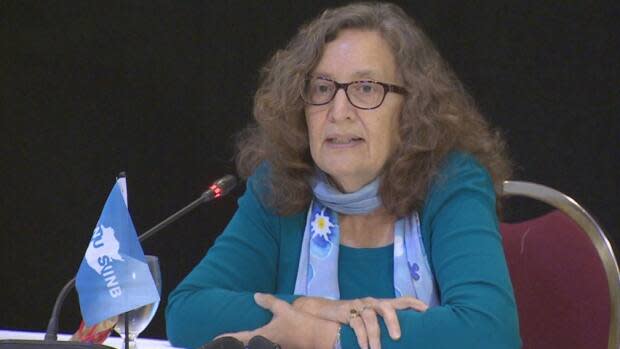
Such cost-cutting decisions reflect a "custodial attitude, as if the people who live in nursing homes just need to be fed and watered and kept clean," she said during a news conference in Fredericton Thursday. "It does not see them as full human beings.
"Residents who live in nursing homes are not chairs to be dusted. They're full of human beings."
The government should also add contracted nursing home inspectors, overseen by an experienced compliance specialist, for at least three years, to "restore acceptable levels of accountability" in New Brunswick nursing homes.
Standards and compliance have become "lax, and must be strengthened," according to the report.
As of spring 2020, for example, seven of the province's 68 nursing homes still didn't have their 2019 inspection reports posted online.
Mandate RN-resident ratios
Similarly, the report recommends the government check compliance with minimum registered nurse staffing standards in every nursing home and establish penalties for violations, rather than just issue non-compliance notices.
"It is clear from the evidence presented in this report that New Brunswick nursing homes are either unwilling or unable to meet their current RN staffing ratios and — in some cases — the requirement for maintaining even one RN on duty," it states.
Nearly one-third of all RNs in New Brunswick's long-term care sector left their positions in 2017.
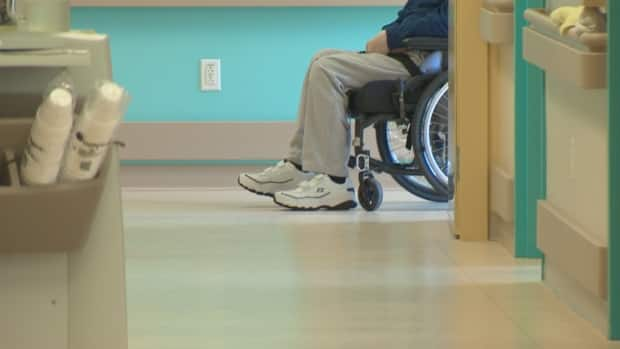
In 2019, 31 nursing homes received non-compliance notices for violations of staffing ratios, including every home in the Restigouche region and the Acadian Peninsula, "yet these trends continue unabated."
New Brunswick should follow the lead of Australia, California and Quebec by implementing RN-to-resident care ratios to "ensure resident safety is never compromised by economic pressures."
Mandated RN-resident ratios in other jurisdictions are between 1:20 and 1:44, depending on the time of day, according to the report.
Track violent incidents
The province's annual nursing home inspections should include a review of violence, tracking totals found in major incident reports and elsewhere, and require that every nursing home in New Brunswick complete its annual workplace violence assessment, the union recommends.
As it stands, nearly one-quarter of all WorkSafeNB claims for workplace violence come from employees of nursing homes, but evidence suggests that much of the violence goes unreported.
In 2018, three-quarters of nursing home RNs surveyed said they had experienced a violent incident.
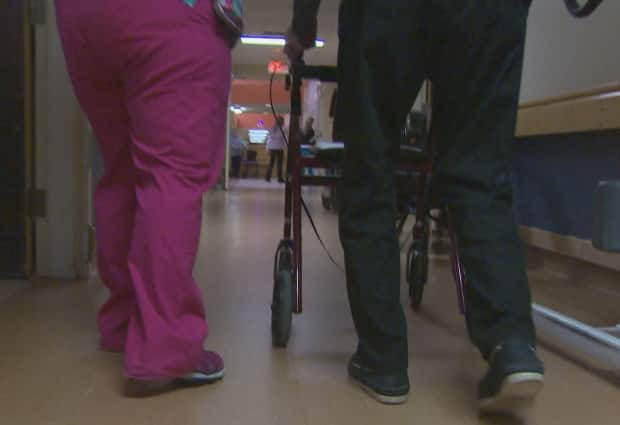
Sixty-five per cent reported that the violence originated with residents, while the rest involved family members of residents, co-workers or employers, according to the union.
"Perhaps most worryingly, 45 per cent of RNs surveyed said they made no attempt to report the violence against them," the report states.
"Government, employers and public sector unions should convene a roundtable on aggression, violence and sexual aggression in the long-term care sector, to review best practices, and to develop and adopt common policies and/or collective agreement language that provides a comprehensive response to these trends."
Seeks studies by auditor general and seniors' advocate
The union wants the Higgs government to create an independent and non-partisan commission to examine the status of long-term care in New Brunswick.
The commission should be named no later than the first 2021 sitting of the legislature, and must have the authority to send for persons, papers and records and to examine witnesses under oath, the union said.
In the interim, it recommends cabinet ask the auditor general to conduct an investigation into the issues raised in the report, and make sufficient funds available.
The Office of the New Brunswick Seniors' Advocate should also undertake a funding review of the long-term care sector, based on a recent similar review by its counterpart in British Columbia, the report recommends.
These two investigations should inform the work of the independent commission, the union said.
The commission's recommendations should then inform a revised long-term care strategy for New Brunswick and a revision of the Nursing Homes Act.
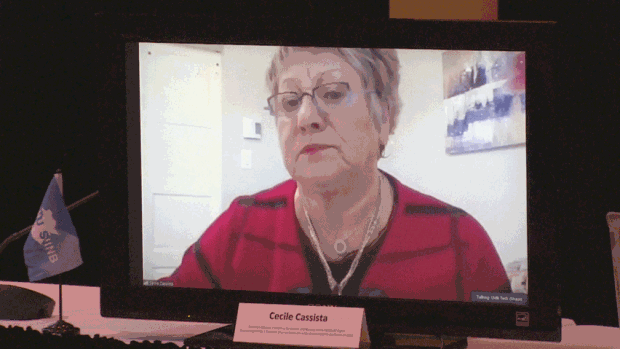
The act should be revised to include evidence-based staffing standards, violence-prevention mechanisms, and "demonstrable commitments to public reporting, accountability and transparency," according to the report.
These two revised documents should then form the foundation of future long-term care in New Brunswick, it recommends.
"These recommendations are not presented as a menu from which Government may pick or choose. The serious challenges facing New Brunswick's long-term care sector are multi-faceted, and only a comprehensive multi-faceted approach can make inroads into dealing with them," the report states.
The government has "routinely ignored" many of the suggestions made by previous reports about long-term care, including those of its own auditor general, according to the union.
As a result, the union plans to publish a report card on the recommendations in its report by fall 2023.
Act now to address nursing shortage
Among some of the other recommendations, nursing homes should make immediate arrangements, in co-operation with the government, to increase the amount of full-time permanent positions being offered to nursing home RNs, targeting a ratio of no more than two casual job offers for each permanent offer.
The reliance on casual staffing in many nursing homes has risen to "unacceptably high levels," according to the union.
"Absent financial incentives, offers of full-time permanent employment — with their accompanying pension and benefits — are one of the few tools available to nursing home employers when navigating a highly competitive job market, especially in rural areas," the report states.

In 2019, the Horizon Health Network and Vitalité Health Network reported a need for an additional 520 registered nurses a year for the next five years.
The government should "immediately move" to address the nursing shortage by taking the University of New Brunswick up on its offer to expand its four-year bachelor of nursing program by over 300 seats, according to the union.
It should also ensure that the University of Moncton's ability to recruit into its bachelor of nursing programs is strengthened, the union said.
New Brunswick's nursing strategy, published last year, called for increased promotion of the RN profession among K-12 students.
The government should also require that a percentage of nursing student work placements take place within the long-term care sector to help expose students to possible careers within the system, the union said.
In addition, the government should make a "determined and adequately funded effort" to recruit more internationally educated nurses, with a goal of registering 50 per year in the long-term care sector, the report recommends.
Transparency and accountability
To increase transparency and accountability, the government should undertake a review of the Right to Information and Protection of Privacy Act and the systems that support it, with an eye to making information on government partnerships more accessible to New Brunswickers, the union said.
The public should have "easy access" to information regarding how much the government spends on the province's vulnerable seniors, the staff who care for them and the buildings that house them, it contends.


